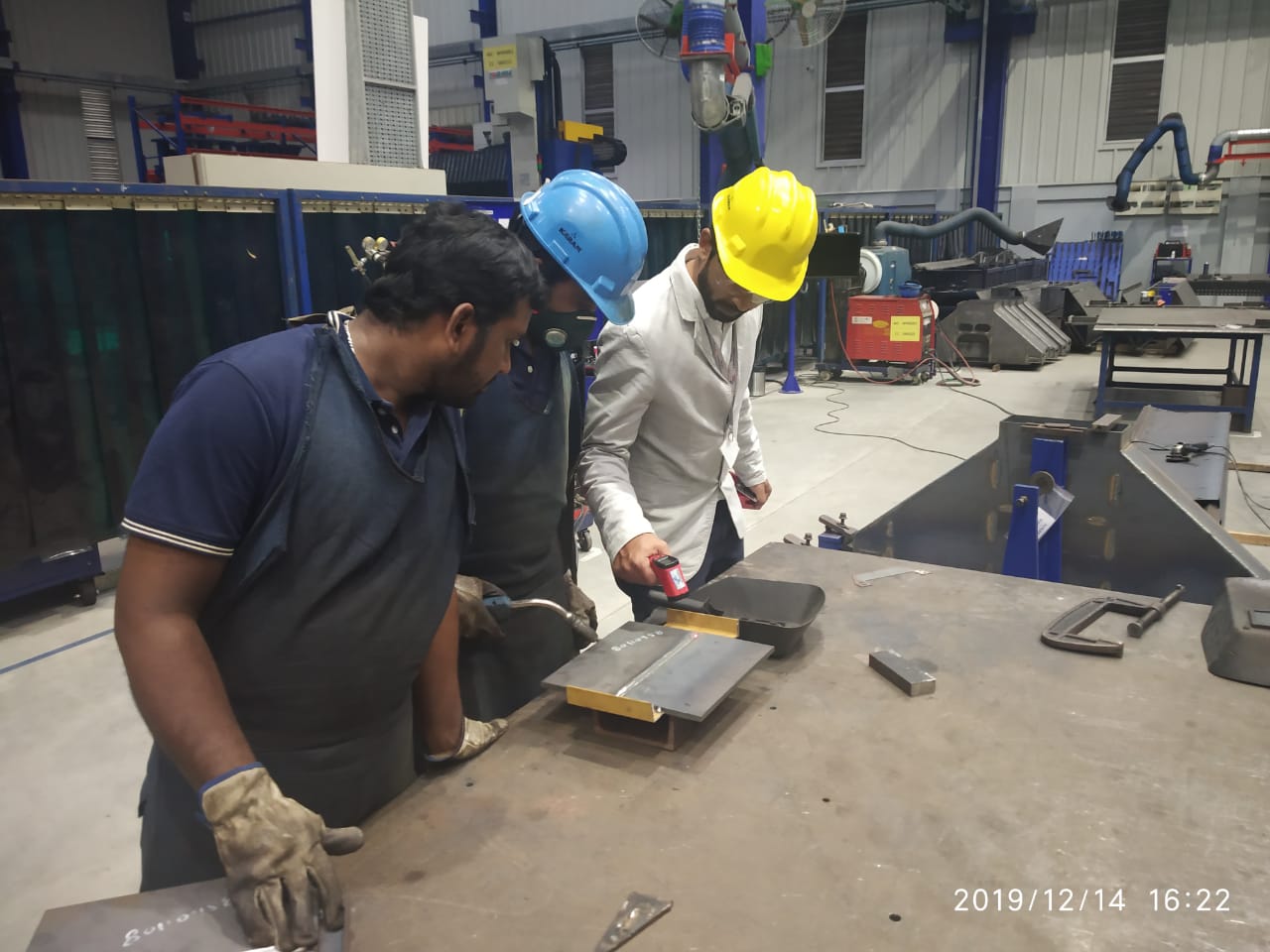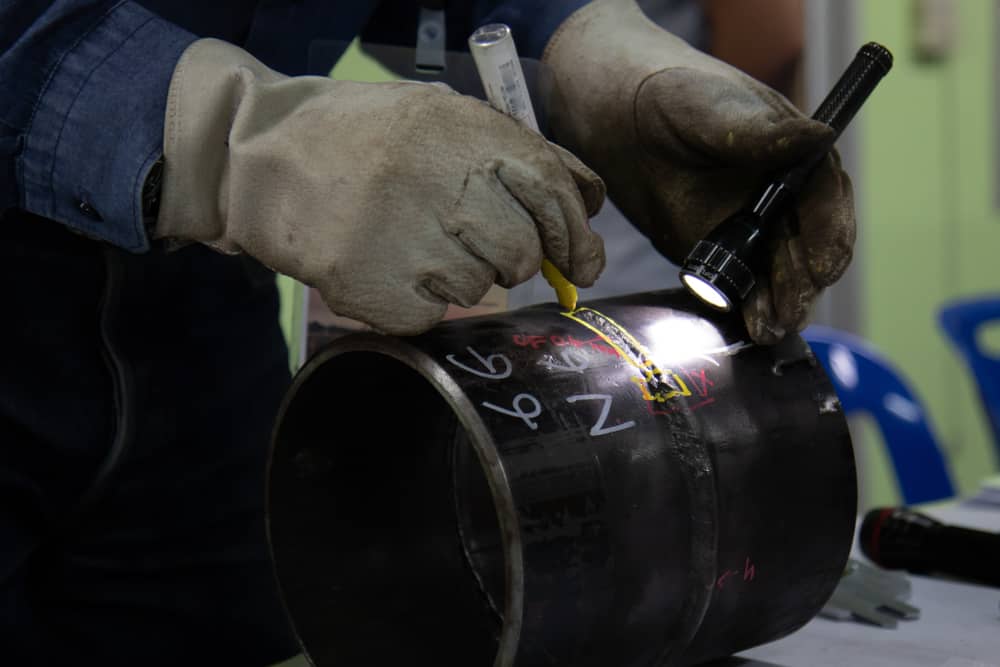The Ultimate Checklist for Welding Inspection Gilbert Arizona: Ensuring Safety and Precision
The Ultimate Checklist for Welding Inspection Gilbert Arizona: Ensuring Safety and Precision
Blog Article
The Effect of Strenuous Welding Assessment on Sector Criteria: Promoting Safety, Dependability, and Conformity Across Various Markets
The duty of extensive welding assessment is progressively recognized as an important part in enhancing industry criteria, where safety and security, compliance, and reliability take precedence across diverse markets. What changes might we prepare for in welding methods as the need for top quality and security increases?
Relevance of Welding Inspections
Identifying the vital duty of welding examinations in maintaining high quality and safety and security requirements, market experts focus on these assessments to guarantee structural stability. Welding evaluations function as a vital checkpoint in the construction process, identifying defects that can jeopardize the durability and safety and security of welded structures. By systematically evaluating welds, inspectors can spot issues such as incomplete penetration, porosity, and splits, which might not show up to the nude eye.
The relevance of these inspections expands beyond plain compliance; they are vital for safeguarding lives and shielding financial investments. In critical markets such as building, manufacturing, and aerospace, a single faulty weld can bring about devastating failings, leading to both monetary loss and human casualties. Consequently, executing extensive inspection protocols mitigates these risks and boosts overall task dependability.
In addition, consistent welding evaluations cultivate a culture of top quality across organizations, encouraging welders to comply with finest methods and keep high criteria in their work. This dedication to top quality not only enhances functional effectiveness yet additionally enhances the credibility of business within their corresponding fields. Hence, welding examinations are vital in promoting security, integrity, and compliance throughout different industries.
Trick Sector Standards and Laws
The structure of welding assessments is underpinned by a robust collection of sector criteria and guidelines that regulate practices across different markets. Secret institutions, such as the American Welding Culture (AWS) and the International Organization for Standardization (ISO), establish guidelines that ensure quality and security in welding operations. AWS D1.1 details important demands for welding steel frameworks, while ISO 3834 specifies high quality needs for blend welding.
In addition to these details requirements, industry policies like the American National Standards Institute (ANSI) and Occupational Safety And Security and Health And Wellness Administration (OSHA) requireds better improve conformity by setting safety and security methods and functional ideal methods. These guidelines are vital in markets such as production, aerospace, and building, where welding honesty is extremely important.
Additionally, sector-specific standards, such as those from the American Culture of Mechanical Designers (ASME) for stress vessels, supply added layers of analysis to ensure that welds satisfy rigorous security and performance requirements. Adherence to these criteria not only helps with governing conformity yet additionally promotes a culture of top quality and reliability across the welding market, inevitably securing public welfare and enhancing functional performance.

Advantages of Conformity and Dependability
Continually sticking to industry criteria and policies in welding inspections returns substantial advantages, enhancing general reliability and performance. The primary benefit is the guarantee of high quality in welded joints, which straight adds to the security of structures and equipment. Compliance with well established criteria reduces the threat of failing and tragic cases, thus protecting both human life and beneficial possessions.
Furthermore, organizations that focus on strenuous welding examinations click now promote a society of responsibility and expertise. This dedication not only boosts the credibility of the company however likewise imparts self-confidence in stakeholders and clients regarding the honesty of products and solutions. Reputable welding processes cause minimized costs connected with rework, repair services, and possible legal obligations originating from poor craftsmanship.
Furthermore, keeping conformity with sector criteria assists in smoother regulative interactions, as companies can readily demonstrate adherence to required methods (Welding Inspection Gilbert Arizona). This proactive strategy can bring about useful collaborations and opportunities within the sector, along with accessibility to new markets
Difficulties in Welding Evaluation
Navigating the complexities of welding assessment provides a myriad of difficulties that can impede conformity with industry standards. The absence of standardized training for assessors can result in different analyses of inspection standards, which might endanger safety and security and dependability.
Another difficulty depends on the availability of innovative inspection tools - Welding Inspection Gilbert Arizona. While modern technologies such as ultrasonic testing and radiography can enhance detection capacities, their implementation may be restricted by price or schedule, specifically in smaller sized procedures. This variation can result in a dependence on less effective evaluation techniques, enhancing the threat of undetected defects
In addition, the fast-paced nature of modern production usually pressures examiners to focus on rate over thoroughness, possibly overlooking important flaws. Regulative compliance can be intimidating due to the evolving nature of sector requirements, leaving companies struggling to maintain up with the latest requirements. These difficulties demand continual renovation in assessment methods to make sure the integrity of welded frameworks throughout numerous markets.
Future Trends in Welding Practices
Arising modern technologies and progressing methods are established to change welding methods in the coming years. Improvements in automation, such as robotic continue reading this welding systems, are obtaining grip, improving precision and effectiveness while reducing human error. These systems will certainly not only speed up manufacturing but also help with consistent quality assurance, addressing several of the obstacles dealt with in manual welding.
Furthermore, the combination of synthetic knowledge (AI) and device learning right into welding processes is positioned to revolutionize examination and tracking. Real-time information analytics will certainly enable predictive maintenance, permitting for positive treatments that lower downtime and boost security. Increased truth (AR) and digital fact (VIRTUAL REALITY) innovations are becoming crucial in training welders, supplying immersive experiences that enhance ability growth without the threats connected with traditional techniques.
Sustainability is likewise a vital trend, as sectors look for greener techniques. The adoption of environment-friendly materials and approaches, together with energy-efficient machinery, will likely come to be basic. As sectors adapt to these adjustments, the emphasis will move towards greater conformity with security and ecological laws, ensuring that welding practices not only satisfy current criteria yet additionally lead the way for a more secure and more sustainable future.

Conclusion
In conclusion, rigorous welding inspections considerably boost industry standards by making certain safety and security, reliability, and compliance across different fields. By methodically identifying problems and adhering to established standards, these assessments alleviate have a peek at this website threats connected with architectural failings. The promo of liability amongst welders causes greater top quality results, cultivating trust fund within areas. As sectors remain to focus on operational integrity, the value of detailed examinations will just boost, eventually benefiting organizations and society at huge.
The role of strenuous welding evaluation is progressively recognized as an essential element in boosting sector standards, where safety and security, reliability, and compliance take precedence throughout varied fields. Therefore, welding assessments are important in promoting security, integrity, and compliance throughout numerous industries.
Secret establishments, such as the American Welding Culture (AWS) and the International Organization for Standardization (ISO), develop standards that guarantee high quality and safety and security in welding procedures. AWS D1.1 outlines vital requirements for welding steel frameworks, while ISO 3834 specifies high quality needs for combination welding.
In final thought, extensive welding evaluations considerably enhance sector criteria by ensuring security, integrity, and compliance throughout numerous sectors.
Report this page